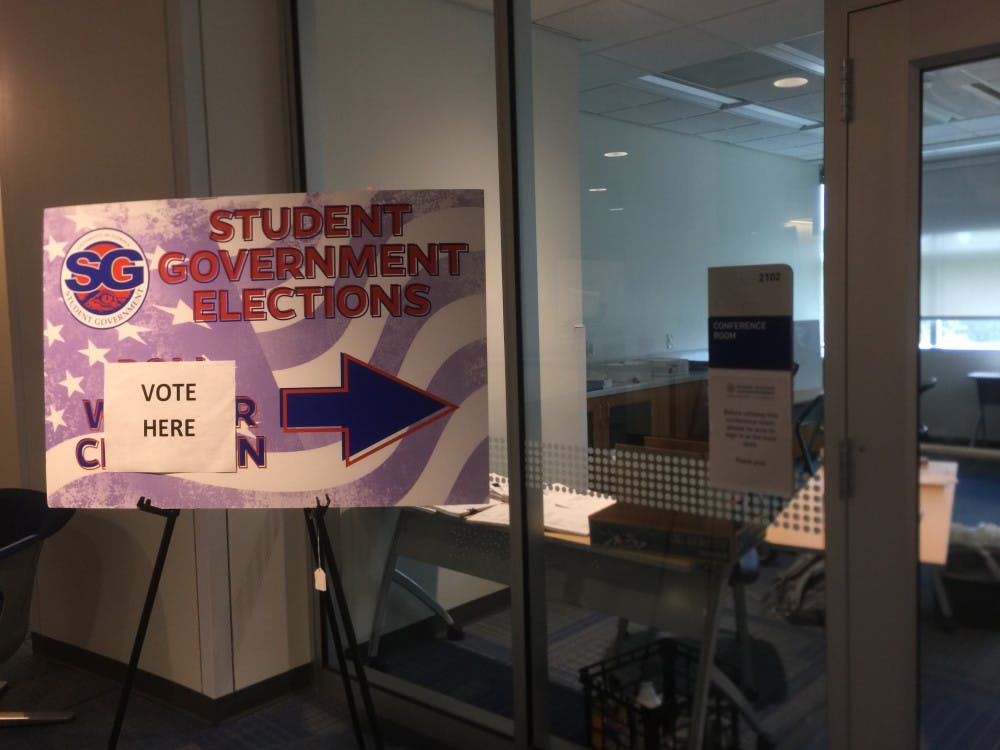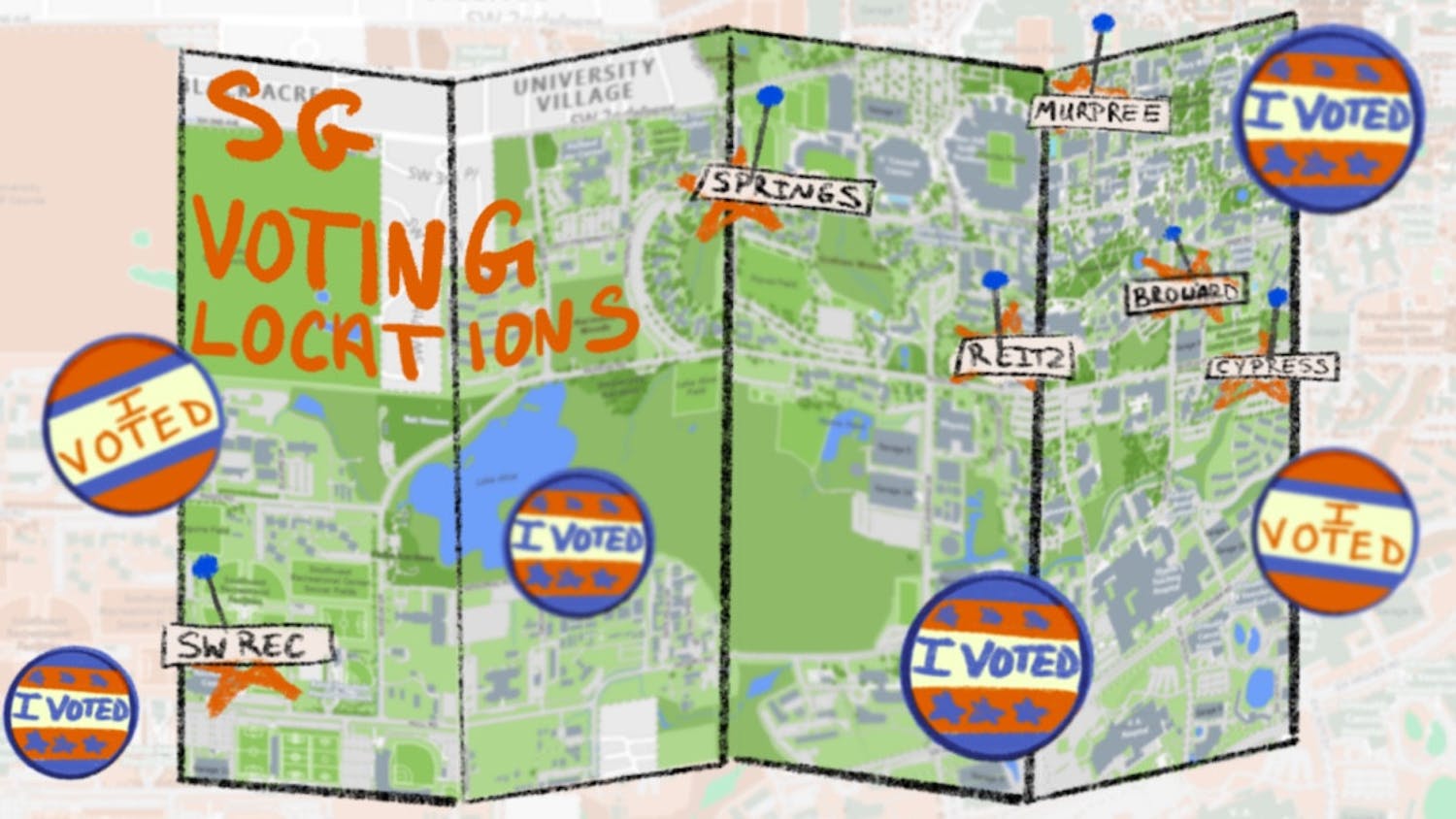The first day of voting for the UF Student Government Spring Election included some technical difficulties, short lines and about an 80% decrease in voter turnout from last Spring’s election.
Polls opened Tuesday at 8:30 a.m. and will close Wednesday at 8:30 p.m. Students can vote for a new Student Body president, vice president and treasurer from the Change Party, the Gator Party and the Keg Party. Change and Gator also have senators running for 50 seats that will represent each UF college, as well as freshmen, sophomores and graduate students.
Supervisor of Elections Hayley Price said 1,146 ballots were cast Tuesday. Last Spring’s election had over 7,000 votes on the first day, before the campus COVID-19 shutdown.
Stickers on the floor at the Reitz Union clearly enforced social distancing and poll workers continuously reminded students voting in groups to distance themselves in line. Masks were enforced at all times, and room capacities were posted at all locations.
Lines hit a maximum of 10 people at a time, and students waited an average of 5 minutes to vote. But, some still faced technical difficulties trying to cast a ballot.
John Strowbridge, an 18-year-old UF finance freshman, went to the Reitz Union around 3:30 p.m. to vote after his requested absentee ballot never arrived in the mail. However, when he arrived, he had to wait for approval from the supervisor of elections because the computer voting system flagged him for trying to cast a second vote.
This was an issue at voting sites Tuesday, as some students who didn’t receive an absentee ballot after requesting one had to wait an extra 10 to 15 minutes to get cleared.
At 5 p.m., the Information Communication system also experienced some difficulties and any students who had requested an absentee ballot were not able to cast their vote until 7 p.m. Other students in the Reitz Computer Lab struggled with internet connection to use two-factor authentication to sign into their UFL accounts to vote.
Price did not answer questions asking why students who requested absentee ballots didn’t get their ballots, how many students this affected, or why students had problems with Reitz’s internet connection to get a Duo Mobile authentication to vote.
Alexandra Morse, a 19-year-old UF marketing freshman, showed up to the Broward Recreation Room around 10:30 a.m. to vote for Change. She said she doesn’t believe Gator’s current leadership represents minority demographics in the Student Body such as racial minorities, socioeconomic minorities and students who aren’t a part of Greek life.
Morse said she grew up facing discrimination as a Jewish American in a majority-Christian area. Because of this, she is hoping her vote will help improve student representation in SG.
“They're the ones who make decisions on my behalf, so if I don't vote I don't really have a say in what happens to me and my academics,” she said. “I think everyone deserves to have a voice since we all have to pay to be here.”
Gustavo Contreras, a 21-year-old UF political science junior who voted for Gator, said he liked Change’s ideas and initiative but did not believe the candidates were qualified enough to take over SG during the pandemic.
“Maybe in a perfect world I would have voted for the Change Party, but right now we need someone who knows what they are doing,” he said.
He said he supported Change’s ideas of working on campus infrastructure to address traffic safety, which include the building of a sky bridge from midtown to the O’Connell Center.
However, he was worried such high-scale projects would result in an increase of student fees that many students cannot afford during a pandemic. Therefore, Gator’s platform point to keep tuition costs low was more important at the moment.
Toward the end of the day, the Election Commission heard two complaints Tuesday from Gator against Change alleging Change violated election procedures in its campaign.
Gator complained about a Change campaign video that had the SG logo, going against election codes which state the Supervisor of Elections has the exclusive right to distribute campaign material with the logo. The Election Commission accepted this complaint and ordered Change to remove the video from its social media.
The second complaint from Gator referred to another Change campaign video, accusing Gator’s Student Body presidential candidate Cooper Brown of hiding outside donations from Turning Point USA, a non-profit right-wing organization for high school and college students.
The Election Commission unanimously denied the complaint because it did not have the power to interpret defamation. It determined such interpretation is up to the Student Conduct Code and state law.
Brett Gross, a 20-year-old UF finance sophomore, said even though he was not familiar with any of the party’s specific projects and goals, he thought the Gator candidates were the best choice.
“I trust Gator’s judgement and that they will know what is best for all of us,” he said.
Luciana Montalban, a 21-year-old UF animal science senior, said she voted for Change Party because she was drawn to the party’s proposed mental health improvement initiatives.
Montalban said she was stopped by Wynton White, Change’s Student Body presidential candidate, while walking around campus. Montalban said White told her about the party’s plan to provide more therapists for students, including therapists for minorities.
“It’s really hard to not have a therapist that looks like you or like can understand your issues,” she said.
Alexander Lugo, Carolina Ilvento, Julia Cooper, Manny Rea, Sofia Echeverry and Valeriya Antonshchuk contributed to this report.






